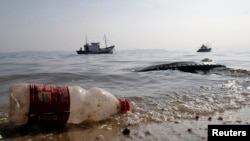International Olympic Committee members meeting in Rio de Janeiro this week will understand if its waters are not completely clean for the sailing events in 2016, the state's governor said on Monday.
"Of course they will understand if we don't meet our target," state governor Luiz Fernando Pezao told reporters on Monday, stressing again that Rio's priority was cleaning up the Guanabara Bay for future generations.
"We are going to show them that we are making lots of investment in this area," Pezao added.
The dirty state of the bay's waters are sure to be a topic of conversation for IOC members.
When it bid to host the 2016 Olympic Games, Rio said it would cut the amount of raw sewage flowing into the bay by 80 percent but has since admitted it is unlikely to meet that target.
Earlier this month Pezao said the amount of sewage treated before being dumped into the bay had increased from 17 percent to 49 percent with 18 months before the Games begin.
The cleaning of Guanabara Bay was a key part of Rio's bid and has long been a goal of various local governments.
Hundreds of millions of dollars have already been spent but the waters remain fetid, with Olympic sailors who visited the city for test events complaining of floating sofas and animal carcasses.
Some have described the water as a "sewer" while biologists last year said rivers leading into the bay contained a superbacteria that is resistant to antibiotics that can cure urinary, gastrointestinal and pulmonary infections.
Officials from federal, state and municipal government made similar lofty promises about adding public transportation infrastructure before Brazil hosted the World Cup last year.
But the promised bus lanes and tram lines in cities like Manaus and Cuiaba were not ready for the tournament and there is little chance of them ever being ready.





